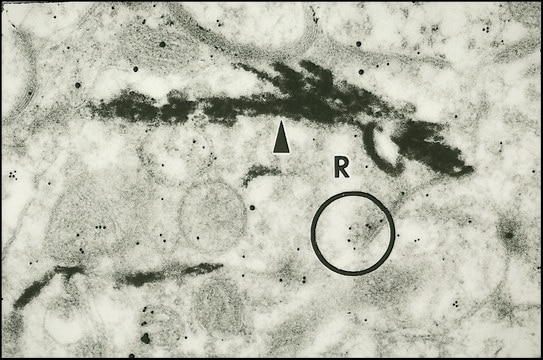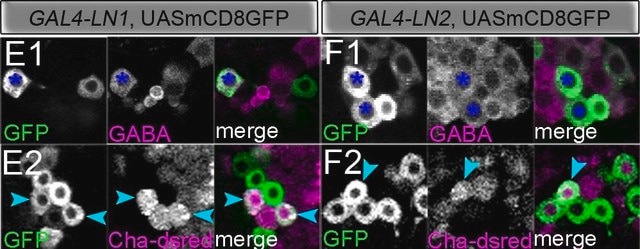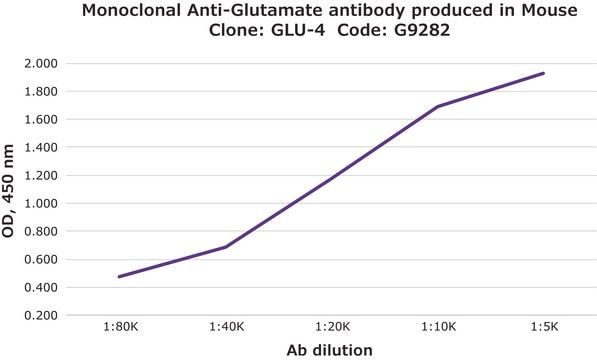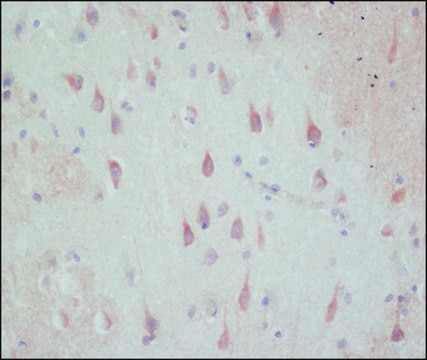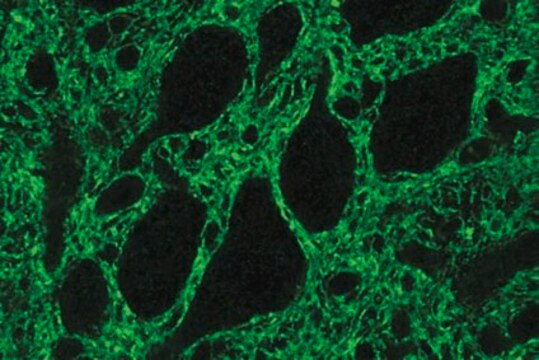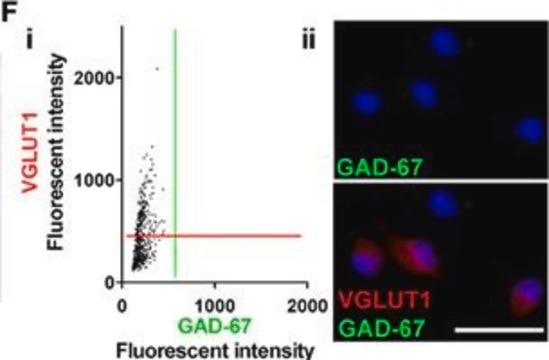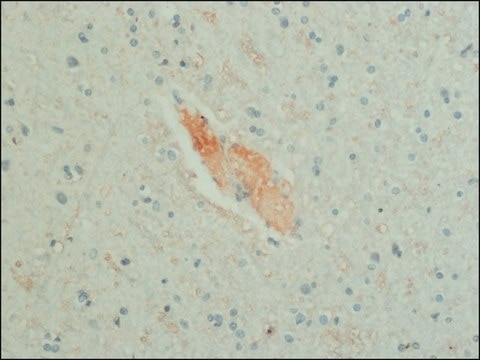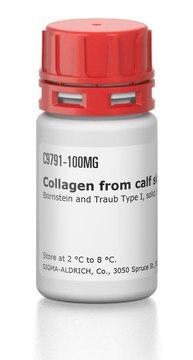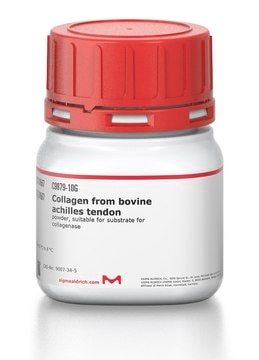AB5018
Anti-Glutamate (No Glutaraldehyde) Antibody
Chemicon®, from rabbit
Sign Into View Organizational & Contract Pricing
All Photos(1)
About This Item
UNSPSC Code:
12352203
eCl@ss:
32160702
NACRES:
NA.41
Recommended Products
biological source
rabbit
Quality Level
antibody form
purified immunoglobulin
antibody product type
primary antibodies
clone
polyclonal
species reactivity (predicted by homology)
all
manufacturer/tradename
Chemicon®
technique(s)
immunohistochemistry: suitable
shipped in
wet ice
target post-translational modification
unmodified
Related Categories
Specificity
Glutamate (L-Glutamate). The antibody has been calibrated against a spectrum of antigens to assure hapten selectivity and proper affinity. No measurable cross-reactivity (<1:1000) against glutamate in peptides or proteins. No measurable glutaraldehyde-fixed tissue cross-reactivity (<1:1000) against L-alanine, gamma-aminobutyrate, 1-amino-4-guanidobutane (AGB), D/L-arganine, D/L-aspartate, L-citrulline, L-cysteine, D/L-glutamine, glutathione, glycine, L-lysine, L-ornithine, L-serine, taurine, L-threonine, L-tryptophan, L-tyrosine. Modest cross-reactivity (1:20) against D-glutamate. Significant cross-reactivity (1:8) against free NAAG in competition assays (NAAG is not retained in glutaraldehyde-fixed tissue).
Immunogen
Glutamate-glutaraldehyde
Application
Immunohistochemistry using silver-intensified immunogold or fluorescence (see recommended protocol). Samples should be fixed with 0.1% - 2.5% glutaraldehyde for optimum detection.
*This antibody has also been used and found to work with a zero-low glutaraldehyde / high paraformaldehyde fixation (4% paraformaldehyde in 0.1M phosphate buffer / 3% sucrose fixative ). The minimum glutaraldehyde concentration for AB5018 is 0.00%. See protocol that follows. Performance is good with frozen sections, Vibratome sections and tissue culture formats, when penetrating reagents such as 0.3% Triton X-100 are used.
Optimal working dilutions must be determined by the end user.
DILUTION: Prepare enough of the AB5018 for your days use by diluting 100X with 1% GSPBT.
*This antibody has also been used and found to work with a zero-low glutaraldehyde / high paraformaldehyde fixation (4% paraformaldehyde in 0.1M phosphate buffer / 3% sucrose fixative ). The minimum glutaraldehyde concentration for AB5018 is 0.00%. See protocol that follows. Performance is good with frozen sections, Vibratome sections and tissue culture formats, when penetrating reagents such as 0.3% Triton X-100 are used.
Optimal working dilutions must be determined by the end user.
DILUTION: Prepare enough of the AB5018 for your days use by diluting 100X with 1% GSPBT.
Research Category
Neuroscience
Neuroscience
Research Sub Category
Neurotransmitters & Receptors
Neuroinflammation & Pain
Neurotransmitters & Receptors
Neuroinflammation & Pain
This Anti-Glutamate (No Glutaraldehyde) Antibody is validated for use in IH for the detection of Glutamate (No Glutaraldehyde).
Physical form
Format: Purified
IgG fraction in sterile 0.1M phosphate buffer. No preservative.
Storage and Stability
Maintain stock at 2-8°C in undiluted aliquots for up to 6 months. This stock is extremely stable under normal use and routine storage at 2-8°C. Do not freeze.
Legal Information
CHEMICON is a registered trademark of Merck KGaA, Darmstadt, Germany
Disclaimer
Unless otherwise stated in our catalog or other company documentation accompanying the product(s), our products are intended for research use only and are not to be used for any other purpose, which includes but is not limited to, unauthorized commercial uses, in vitro diagnostic uses, ex vivo or in vivo therapeutic uses or any type of consumption or application to humans or animals.
Not finding the right product?
Try our Product Selector Tool.
hcodes
pcodes
Hazard Classifications
Aquatic Chronic 3
Storage Class
12 - Non Combustible Liquids
wgk_germany
WGK 2
flash_point_c
Not applicable
Certificates of Analysis (COA)
Search for Certificates of Analysis (COA) by entering the products Lot/Batch Number. Lot and Batch Numbers can be found on a product’s label following the words ‘Lot’ or ‘Batch’.
Already Own This Product?
Find documentation for the products that you have recently purchased in the Document Library.
Glutamate, excitatory amino acid transporters, Xc- antiporter, glutamine synthetase, and gamma-glutamyltranspeptidase in human corneal epithelium.
Marlyn P Langford,Patrick Redmond,Raul Chanis,Raghunath P Misra,Thomas B Redens
Current Eye Research null
Virus-induced changes in the subcellular distribution of glutathione precursors in Cucurbita pepo (L.).
Zechmann, B, et al.
Plant Biology (Stuttgart, Germany), 9, 427-434 (2007)
Depletion of taurine and glutamate from damaged photoreceptors in the retinas of dogs with primary glaucoma.
James E Madl, Tonya R McIlnay, Cynthia C Powell, Juliet R Gionfriddo
American Journal of Veterinary Research null
Md Abdul Alim et al.
Cellular & molecular immunology (2020-04-22)
Mast cells are emerging as players in the communication between peripheral nerve endings and cells of the immune system. However, it is not clear the mechanism by which mast cells communicate with peripheral nerves. We previously found that mast cells
Terri L Whitworth et al.
The Journal of neuroscience : the official journal of the Society for Neuroscience, 22(1), RC192-RC192 (2002-01-05)
5-HT transporters (SERTs) are transiently expressed in thalamocortical neurons during development, permitting these glutamatergic neurons to co-release 5-HT as a "borrowed" transmitter. The high level of SERT expression in these neurons is likely important in the serotonergic modulation of neocortical
Our team of scientists has experience in all areas of research including Life Science, Material Science, Chemical Synthesis, Chromatography, Analytical and many others.
Contact Technical Service